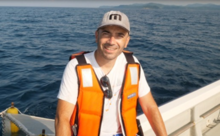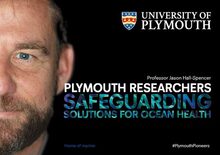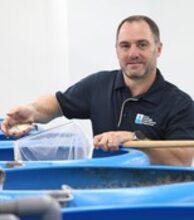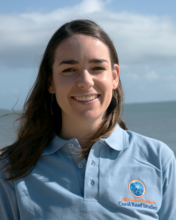Past Events
[Seminar] Tara Jambio Microplastic Joint Survey: Science x Art x Education
2023-06-07Speaker: Sylvain Agostini (Dr. Sci.)
Shimoda Marine Research Center, University of Tsukuba (Assistant Professor)
Tara Ocean Japan (Director)
Hosted by: Professor Timothy Ravasi, OIST Marine Climate Change Unit
Abstract: This presentation will introduce the activities of the Tara Océan Foundation around the world and the Tara JAMBIO Microplastics Joint Survey, which began in 2020 using research vessels of marine stations around Japan. With the support of various private organizations, and with the cooperation of national universities participating in the JAMBIO network. (...)
[Seminar] Coral reef ecology and restoration research at the St. John’s Island National Marine Laboratory, Singapore
2023-05-19Speakers:
Dr. Jani Tanzil, the Deputy Director of the St. John’s Island National Marine Laboratory and a Senior Research Fellow at the Tropical Marine Science Institute (TMSI), National University of Singapore
Dr. Lionel Ng, Research Fellow at TMSI, National University of Singapore
Mr. Ow Yong Wei Long, Research Assistant with the Coral Team at TMSI, National University of Singapore
Hosted by: Professor Timothy Ravasi, OIST Marine Climate Change Unit
This talk will a broad overview of marine science research conducted in Singapore, with a focus on coral reef ecology and restoration efforts. This talk will also share more about Singapore’s only offshore marine research facility, the St. John’s Island National Marine Laboratory (SJINML), as a research infrastructure open to all marine science researchers, both local and international (https://sjinml.nus.edu.sg/).
[Seminar] Temperate carbonate reefs, 'blue carbon' and the 'plastisphere'
2022-12-06
This talk will introduce two major forms of cold-water biogenic habitats. Deep-sea coral reefs are extensive in the NE Atlantic region due to high food availability and high carbonate saturation levels. Maerl beds are calcified seaweed habitats and are the oldest biogenic habitat type found in shallow waters of the region. (...)
[Seminar] Enhancing detection of pest species using environmental DNA/RNA in biosecurity
2022-10-26Speaker: Dr Alejandro Trujillo-Gonzalez, Principal Scientist, National eDNA Reference Centre, University of Canberra, Canberra, ACT, Australia
Hosted by: Dr. Roger Huerlimann, OIST Marine Climate Change Unit
Abstract: Globalisation is increasing the rate and complexity of trade connections between countries. This increasing network of interactions, in hand with the movement of both people and goods, puts countries at risk of invasive pests and diseases, constraining their capacity to protect economic, ecological, and social livelihood. Tackling the increasing influx of invasive pests and pathogens requires the use of biosecurity measures within diverse methodologies used to detect, eradicate, and minimize the inherent risks of these unwanted species. (...)
[Seminar] Comparative analysis of the cobia (Rachycentron canadum) genome identifies ephx1 as a novel putative master sex-determining gene in teleosts
2022-09-15Speaker: Dr Xueyan Shen, Senior Lecturer Aquaculture Institute, James Cook University Singapore.
Hosted by: Dr. Roger Huerlimann, OIST Marine Climate Change Unit
Abstract:
Cobia (Rachycentron canadum) is the only member of the Rachycentridae family and exhibits considerable sexual dimorphism in growth rate. Sex determination in teleosts has been a long-standing basic biological question. The molecular mechanisms of sex determination/differentiation in cobia species is completely unknown. We reported high-quality, chromosome-level genome sequences of male cobia with a genome assembly size of 586.51 Mb (contig/scaffold N50: 86.0 kb/24.3 Mb) and female cobia, 583.88 Mb (79.9 kb/22.5 Mb). (...)
[Seminar] The R&D pathway to growing aquaculture through innovative technologies
2022-09-12Speaker: Professor Dean R. Jerry, Tropical Futures Institute, James Cook University Singapore, Australian Research Council Hub for Supercharging Tropical Aquaculture through Genetic Solutions, James Cook University, Townsville, Australia.
Hosted by: Dr. Roger Huerlimann, OIST Marine Climate Change Unit
Abstract: As the farming of aquaculture species matures the industry is progressively adopting innovation to increase productivity and lower risk due to disease and environmental perturbations. Technologies based on artificial intelligence and machine learning, rapid diagnostics, biosensors, and integration of genomic data are being developed in efforts to obtain precise information on the health and well-being of the cultured species, along with allowing finer-scale management of the production system. (...)
[Seminar] When does taxonomy matter?
2022-08-29Speaker: Professor Andrew Baird, Chief Investigator in the ARC Centre of Excellence for Coral Reef Studies at James Cook University
Hosted by: Professor Timothy Ravasi, OIST Marine Climate Change Unit
Abstract: Molecular approaches have revolutionised our understanding of the systematics and evolution of most branches on the tree of life, including corals. Over the last twenty-five years molecular research has revealed that few of the 18 families and 111 genera recognised by Veron (2000) were monophyletic. New techniques and vision promise a more robust and consistent species level taxonomy, but it will take time and there is always likely to be some uncertainty. It is therefore important to establish when taxonomy matters and when it does not. (...)
[Seminar] The neurobiological effects of ocean acidification on a cephalopod
2022-08-09Speaker: Jodi Thomas, ARC Centre of Excellence for Coral Reef Studies, James Cook University, Townsville, QLD Australia.
Hosted by: Professor Timothy Ravasi, OIST Marine Climate Change Unit
Abstract: The uptake of anthropogenic carbon dioxide (CO2) by the ocean is causing seawater CO2 levels to rise, changing ocean chemistry in a process known as ocean acidification (OA). OA can affect a variety of physiological processes, life history traits and behaviours of fish and marine invertebrates. As invertebrates comprise the vast majority of marine diversity, are essential for key ecosystem processes and support human livelihoods, OA-induced effects of marine invertebrates could have ecological, social and economic consequences.(...)
[Seminar] Rise of the turfs: the simplification of marine ecosystems under ocean acidification by Dr. Ben Harvey, Tsukuba University
2021-12-09Speaker: Dr. Ben P. Harvey, Assistant Professor at the Shimoda Marine Research Center, University of Tsukuba
Hosted by: Professor Timothy Ravasi, OIST Marine Climate Change Unit
Abstract: Human activities are rapidly changing the structure of coastal marine ecosystems, but the ecological consequences of these changes remain uncertain. Natural analogues of futuristic conditions are increasingly being used to assess the likely effects of rising atmospheric CO2 emissions on marine ecosystems. (...)
[Seminar] "Coral reef fish in a changing world: evolutionary potential and ecological limitations" by Philip L. Munday and Jennifer M. Donelson
2019-11-13[SEMINAR]
"Coral reef fish in a changing world: evolutionary potential and ecological limitations"
Philip L. Munday and Jennifer M. Donelson
ARC Centre of Excellence for Coral Reef Studies, James Cook University, Townsville, QLD Australia.
Many short-term experiments have demonstrated the potential impacts of ocean warming and acidification on marine organisms. However, longer-term experiments are needed to test the capacity for acclimation and adaptation to these stressors. In this talk we will describe unique multigenerational experiments being used to test the effects of warming and acidification on coral reef fishes and explore their capacity for thermal plasticity and adaptation.(...)












